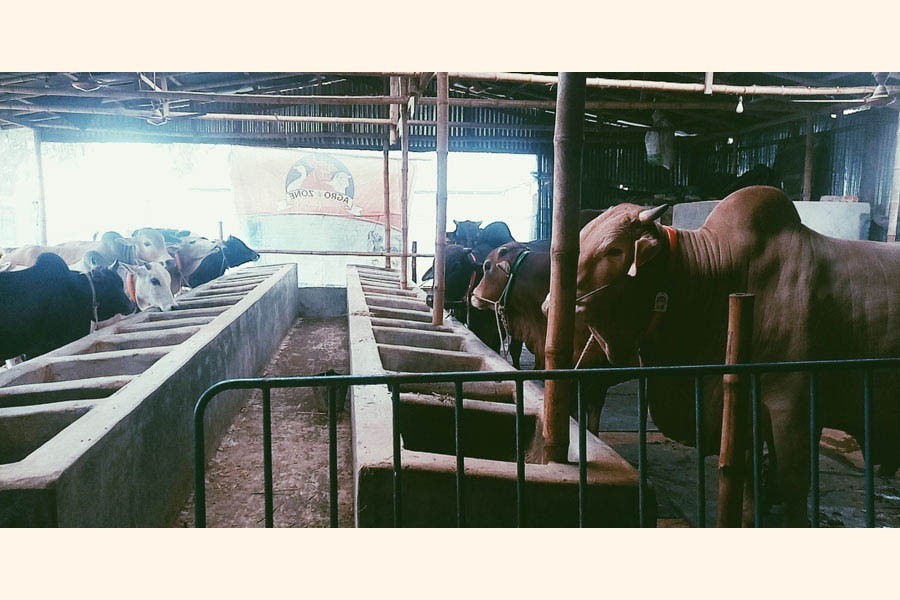Fodder crisis hits cattle farming in Chandpur
Famers also striving with prohibitive prices of the animal feed since the flood aftermath last year

Published :
Updated :

Prevailing scarcity of fodders has made it difficult for cattle farmers in the district to feed their animals.
Fodders have also become pricier in the recent months leaving cattle farm owners as well as marginalised cattle farmers anxious in Kachua, Hajiganj, Faridganj and Chandpur Sadar upazilas.
Talking to The Financial Express, many of the farmers said they are in a great trouble being unable to feed their animals as the prices of fodders have gone up in the local markets for their subsequent crisis in the aftermath of the flooding last year and a prolonged spell of waterlogging.
Most of the cattle farm owners and general farmers are yet to recoup the losses they incurred in the natural calamities.
Sources said each of the general farmers has been traditionally or hereditarily rearing 5-6domestic animals (cows, bulls , goats), even in some cases 20-30, at their homes side by side growing paddy and vegetables in their crop fields.
For want of fodders of minimum quality, it is being very hard for them to feed their animals: and thus many of the animals are becoming rickety for starvation.
Nuru Akhand (78), a resident of Dhalirghat on the outskirts of district town, who has been engaged in selling straws beside Chandpur-Cumilla for the past 50 years, told the FE, dry straw as fodder is scarce in Kachua, Hajiganj, Faridganj and Sadar upazilas and is selling at exorbitant prices.
Each bundle of straw sells at Tk200 which was sold at Tk 125-150 before the last flooding.
Another fodder trader- Rashid Mollah (70), who sells dry straw sitting beside Nuru Akhand also echoed the same.
According to the District Livestock Office, there are as many as 62,000 domestic animals in around 3,269 farms in the eight upazilas of the district.
Cattle farm owners Russel and Mohammad Ibrahim Patwary said they gather and store dry straws for their cattle at home. But incessant rainfall and prolonged waterlogging during the last rainy season damaged their straws. Thus they are facing an acute crisis of dry straw as a fodder.
It was observed in many haats and bazars that oil cake, bran and grinded rice and paddy- which are mostly consumed fodders, were also too costly.
The scarcity of dry straws and its high price have plunged the farm owners and small farmers into financial problems as most of them can hardly afford the item at the high prices for their animals.
A recent visit found that a sack (50kg) of bran was selling for Tk1,800 but before the last flood, it was sold at Tk1,300 only.
A 50-kg pack of grinded rice sells at Tk1,820 whereas it was sold at Tk1,200 before the flooding and waterlogging last year.
Grinded paddy sells at Tk 700 per bag (50 kg) but in the past, before the last flooding, it was sold at Tk 520.
So the affected cattle farm owners and small farm owners have been passing days in great anxieties.
Most of them are dreaming of selling their bulls and goats at high prices during the upcoming Eid-ul-Azha in order to fulfill some long-cherished desires and hopes like buying ornaments for daughters' marriage or sending sons abroad to change the wheel of luck.
Day by day, crop fields and grazing lands in many parts of the villages have also been shrinking and becoming narrow due to the rapid urbanisation in Faridganj, Shahrasti and Hajiganj upazilas.
Another farm owner Abul Kalam Azad of Char Borali village in Faridganj upazila told the FE that for fodder of each cow or bull , on an average Tk250 is spent daily.
Talking to the FE, Ibrahim Patwary of Char Borali said he had bought dry straw as fodder at a cost of Tk 12,000 for his three cows and bulls. But they will eat them all in less than 15 days. There is no grass, nor grazing lands in the open land around too. It will take about 70/75 days to grow fresh grass in the grazing fields.
Now, water hyacinth is also a good source of fodder. But after taking water hyacinth, cows give watery milk which the buyers are less interested to buy and consume.
Faridganj Upazila Livestock Officer Suman Bhowmik told the FE, ''Due to the last flooding and prolonged waterlogging in Faridganj, many dry straw stacks meant for fodder were damaged. It has created fodder scarcity. Fodder items are costly too. We are also keeping eyes so that no shopkeepers can raise prices of fodders in the haats and bazars whimsically.''
maayerbadhon@gmail.com


 For all latest news, follow The Financial Express Google News channel.
For all latest news, follow The Financial Express Google News channel.